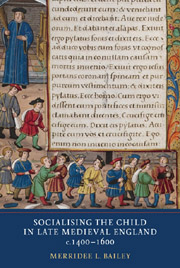Book contents
- Frontmatter
- Contents
- Acknowledgements
- Abbreviations
- Transcription conventions
- Introduction
- 1 Courtesy Poems
- 2 Readers
- 3 Virtue and Vice
- 4 Sixteenth-Century Books
- 5 The School
- Conclusion
- Appendix A Appendix A: English Vernacular Courtesy Poems
- Appendix B Incunabula
- Appendix C Sixteenth-Century Books
- Appendix D Educational Sources
- Bibliography
- Index
- YORK MEDIEVAL PRESS: PUBLICATIONS
1 - Courtesy Poems
Published online by Cambridge University Press: 05 April 2013
- Frontmatter
- Contents
- Acknowledgements
- Abbreviations
- Transcription conventions
- Introduction
- 1 Courtesy Poems
- 2 Readers
- 3 Virtue and Vice
- 4 Sixteenth-Century Books
- 5 The School
- Conclusion
- Appendix A Appendix A: English Vernacular Courtesy Poems
- Appendix B Incunabula
- Appendix C Sixteenth-Century Books
- Appendix D Educational Sources
- Bibliography
- Index
- YORK MEDIEVAL PRESS: PUBLICATIONS
Summary
‘Curteis he was, lowely, and servysable,
And carf biforn his fader at the table’
A young boy sits alone reading a courtesy poem, or sits with his peers hearing it read aloud by an older male of the household. He reads, or hears, that he must show courtesy if he wishes to be considered a gentleman, possibly that he must even be of royal blood truly to appreciate the lessons he is about to discover in these pages of manuscript. He will walk with his lord in the great hall of an elite household estate, he will show care when he eats and he will not stare or gawp at those he meets in the household.
What did a young boy make of this? According to the poems, he was already a young man occupying a high status position in an elite household, serving the lord in a highly ritualised, personal and, above all, elite role. This may well have been true. The motif of youthful service, and particularly in what manner young boys were to serve courteously in households, reflected the organisational structure of the establishments of the nobility which, in the thirteenth century, could be as much as ninety per cent male. Some of these households did in fact own courtesy books; for instance, the duke of Buckingham's household purchased courtesy books, primers and grammars at the beginning of the sixteenth century for the children.
- Type
- Chapter
- Information
- Publisher: Boydell & BrewerPrint publication year: 2012



